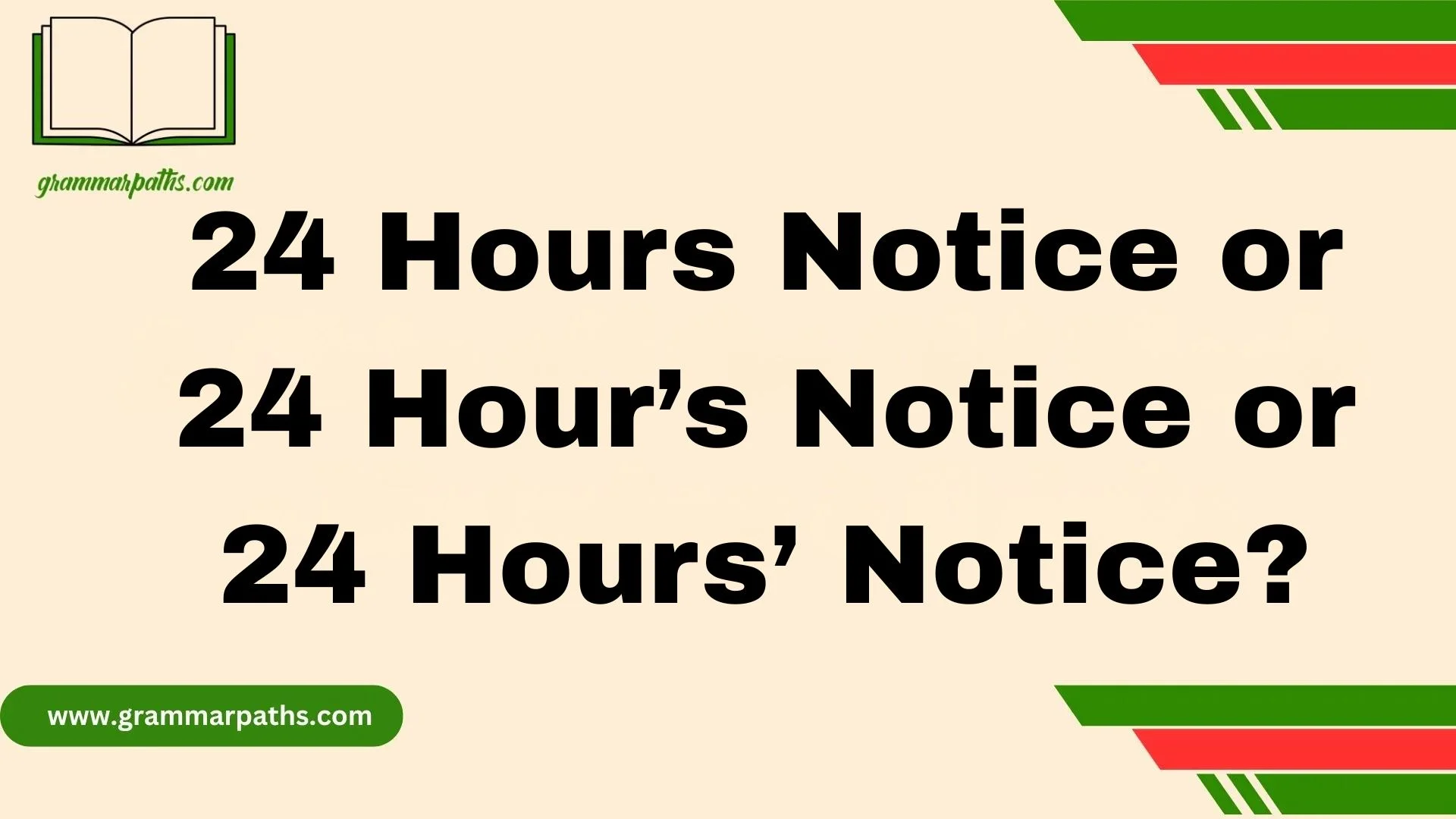The phrase “24 Hours Notice or 24 Hour’s Notice or 24 Hours’ Notice?” shows up a lot in company policies and employee handbooks, but getting it wrong causes big issues. Writing it as “24 hour’s notice” is a mistake, and even dropping the apostrophe—like in “24 hours notice”—is just as incorrect. In my experience reviewing documents for HR and legal settings, I’ve seen how one small error can change the meaning completely. When you’re in high-stakes environments, a simple grammar issue can trigger miscommunication that leads to real problems.
In professional documents, grammar isn’t only about style—it shapes clarity and ensures compliance. These phrases aren’t just about sounding proper; they carry legal weight. One misplaced apostrophe can shift how a term is interpreted. That’s why I always train my HR team to slow down and double-check the phrase, especially when policies are being updated or handbooks revised. A clean, correct phrase reflects precision and keeps problems from ever starting.
Why This Tiny Apostrophe Matters in Everyday and Professional English
Apostrophes cause headaches for many writers, but they serve an important purpose: they show possession or ownership. In the phrase “24 hours’ notice,” the apostrophe tells us that the notice belongs to, or relates to, the 24 hours.
Consider a real-world example: A teacher emails students, “Please give me 24 hours notice before missing a class.” If they write “24 hours notice” without the apostrophe, some might wonder if the time frame is clear. In formal documents like leases or company policies, that small apostrophe can change meaning or even cause legal confusion.
This article breaks down the grammar, usage, and real-life consequences of the apostrophe in time expressions like “24 hours’ notice.” Plus, it shares tips, examples, and case studies tailored for students, teachers, and professionals in the USA.
What’s Correct: “24 Hours Notice” or “24 Hours’ Notice”?
Short answer: The correct form is “24 hours’ notice.”
Here’s a quick look at the three common variants:
| Phrase | Correct? | Explanation |
| 24 hours notice | ❌ No apostrophe means no possession | |
| 24 hour’s notice | ❌ Incorrect singular possessive | |
| 24 hours’ notice | ✅ Correct plural possessive |
The apostrophe shows that the notice belongs to the 24 hours—it’s a possessive form, like “a day’s work” or “a week’s pay.”
The Grammar Behind Time-Based Possession
Why does this phrase need an apostrophe at all? It comes down to time-based possessives.
When units of time (like hour, day, week) describe possession, they use apostrophes. For example:
- a day’s work means the work of one day
- two weeks’ vacation means the vacation of two weeks
- an hour’s notice means notice belonging to one hour
Since “24 hours” is plural, the apostrophe goes after the s—making it a plural possessive.
Singular vs. Plural Possessives: A Quick Guide
| Time Unit | Number | Correct Possessive Form | Example Phrase |
| Hour | Singular | hour’s | an hour’s notice |
| Hours | Plural | hours’ | 24 hours’ notice |
| Day | Singular | day’s | a day’s pay |
| Days | Plural | days’ | three days’ leave |
| Week | Singular | week’s | a week’s work |
| Weeks | Plural | weeks’ | two weeks’ vacation |
Breaking Down the Three Common Variants
24 Hours Notice — Missing the Apostrophe
Many people skip the apostrophe because they write quickly or aren’t sure about the rule. While it might seem like a minor detail, this version lacks the possessive marker and can confuse readers. It looks informal and unpolished, especially in professional emails or legal documents.
24 Hour’s Notice — The Singular Possessive Trap
This version mistakenly uses a singular possessive (“hour’s”) with a plural number (“24”). It’s like saying “24 one-hour notice,” which doesn’t make sense grammatically.
You’ll often see this mistake in students’ essays or casual writing. It’s important to explain to learners that when the quantity is plural, the possessive must be plural too.
24 Hours’ Notice — The Correct Form
This is the gold standard. The phrase clearly shows that the notice belongs to the 24 hours of time given.
Other correct examples:
- 48 hours’ notice
- two weeks’ notice
- 12 days’ leave
Spoken English vs. Written English: Why Mistakes Happen
A big reason people mess up apostrophes in phrases like “24 hours’ notice” is the difference between spoken and written language.
In speech, no one says the apostrophe. You hear:
“Please give me twenty-four hours notice.”
But in writing, apostrophes matter a lot. People also often write fast—especially in texting or casual emails—and forget the rules. This casual style leaks into academic and professional writing, leading to errors.
What Style Guides and Professionals Say
Leading style guides agree:
- APA Style Manual: Use possessive apostrophes for time periods indicating ownership.
- Chicago Manual of Style: Confirms plural possessives like “24 hours’ notice” are correct.
- MLA Style: Follows similar rules for possessives.
Professionals across industries rely on this rule:
| Industry | Examples of Use |
| Legal | Lease agreements, contracts |
| Education | Deadlines, permission notes |
| Corporate HR | Notice periods, policy communication |
Experts like the editors at Grammarly and Merriam-Webster reinforce this apostrophe use in time-based expressions.
Why This Matters in Academic, Professional, and Legal Settings
Getting apostrophes right is more than grammar pedantry—it’s about clear communication and professionalism.
- Students: Teachers expect correct apostrophes in essays and assignments.
- Teachers: Using proper grammar models professionalism and clarity.
- Professionals: In business emails, contracts, or HR policies, incorrect apostrophes can cause misunderstandings or appear careless.
Imagine an HR policy stating:
“Employees must provide 24 hours notice to request leave.”
Without the apostrophe, the policy looks sloppy and less credible.
How to Spot and Fix Time-Based Apostrophe Errors
Here’s a simple checklist to catch errors:
- Is the time unit singular? Add apostrophe before the “s”
Example: “an hour’s notice” - Is the time unit plural? Add apostrophe after the “s”
Example: “24 hours’ notice” - Is the phrase showing possession? If yes, it needs an apostrophe.
- Is it just a description (not possession)? No apostrophe needed.
Flowchart: Apostrophe Placement in Time Expressions
| Question | Yes | No |
| Is the time unit singular? | Apostrophe before “s” | |
| Is the time unit plural? | Apostrophe after “s” | |
| Does the phrase show possession? | Use apostrophe accordingly | No apostrophe needed |
Common Mistakes and How to Avoid Them
Avoid these frequent blunders:
- “a 5 days notice” ❌ — plural time unit, no apostrophe
- “24 hour’s notice” ❌ — singular possessive with plural number
- “two weeks notice” ❌ — missing apostrophe for plural possessive
Editing Tip: Always read your sentence out loud. If it sounds like you’re saying ownership (“notice of the hours”), check if the apostrophe is in place.
Real-Life Examples: What Happens When You Get It Wrong
Case Study 1: HR Memo Confusion
An HR manager sent out a leave request memo saying “Employees must provide 24 hours notice.” Several employees thought the policy was vague. The missing apostrophe caused questions, requiring a follow-up email to clarify. After correction, the policy was clear and enforced smoothly.
Case Study 2: Lease Agreement Mistake
A landlord’s lease read, “Tenant must give 24 hour’s notice before entry.” The tenant challenged this because “hour’s” implies one hour, not 24. The landlord’s lawyer revised the lease to “24 hours’ notice” to accurately reflect the timeframe and avoid legal risk.
Case Study 3: Classroom Assignment Error
A high school student lost points on an English paper for writing “24 hours notice” without the apostrophe. The teacher emphasized that this was a possessive form, and the error reflected a lack of understanding of basic grammar rules.
Final Tips for Students, Teachers, and Professionals
- Prioritize accuracy in formal writing. Details like apostrophes build your credibility.
- Use trusted grammar tools (like Grammarly or Purdue OWL) but understand the rules yourself.
- When proofreading, read sentences aloud to check flow and meaning.
- Remember, in resumes, cover letters, contracts, every punctuation mark counts.
Conclusion: One Little Apostrophe, Big Impact
Using the correct version of the phrase “24 Hours Notice or 24 Hour’s Notice or 24 Hours’ Notice?” is more than just a grammar preference—it’s about accuracy, clarity, and compliance in professional and HR environments.
The correct form is “24 hours’ notice”, where the apostrophe comes after “hours”, showing possession. Mistakes like “24 hour’s notice” or leaving out the apostrophe can lead to miscommunication, especially in high-stakes contexts such as legal or company policies. Always proof your documents, as these small errors can make a big difference in how your message is perceived.
FAQs
Q1: What is the correct form—24 Hour’s Notice, 24 Hours Notice, or 24 Hours’ Notice?
A: The correct form is “24 hours’ notice.” It uses the plural “hours” with an apostrophe to show possession.
Q2: Why is “24 hour’s notice” incorrect?
A: Because “hour’s” is singular, it doesn’t match the plural time frame. You need to reflect the full 24 hours, not just one.
Q3: Is “24 hours notice” acceptable in casual writing?
A: It might pass in informal contexts, but in professional, HR, or legal documents, it’s considered grammatically incorrect.
Q4: Can grammar errors like this affect company image?
A: Yes. Such errors in official memos, emails, or handbooks can impact credibility, cause delays, and even create compliance risks.
Q5: How can I remember the right usage?
A: Think of it this way: the notice belongs to a period of 24 hours—so hours’ with the apostrophe after the s is the proper possessive form.

Emma Brooke is a passionate language expert and contributor at GrammarPaths.com, where she helps learners navigate the complexities of English grammar, idioms, and effective writing. With a strong academic background and years of teaching experience, Emma excels at turning tricky grammar rules into simple, practical lessons that readers can easily grasp.












